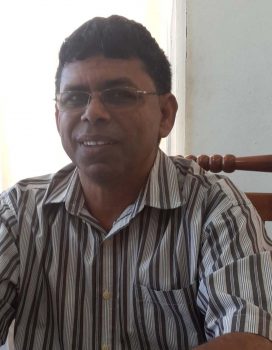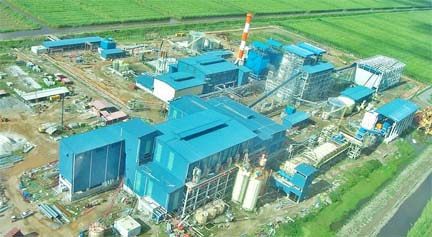If Rajendra Persaud, one of the two brothers who sit at the helm of Nand Persaud and Company Ltd, is disappointed over the fact that the company will now have to formally restate its interest in the acquisition of the Skeldon Sugar Factory, he does not show it.
Less than forty-eight hours after the Corentyne businessman had sketched some of the company’s plans for the multi-million dollar processing plant to the Stabroek Business, the state- run National Industrial and Commercial Investments Ltd. (NICIL) announced that companies that had earlier expressed an interest in buying parts of GuySuCo’s operations, will now have to submit new proposals.
On Saturday, Stabroek Business had met with Rajendra alone in his Corentyne office; the company’s joint CEO, his brother Mahendra, had traveled to Georgetown to join officials of Alimport, the Cuban state agency that has been responsible for negotiating a historic agreement under which the Berbice company has recommenced shipping rice to Cuba after almost two decades. The Alimport officials had travelled to Guyana to witness the loading of the first 7,500 metric tonnes of white rice onto a vessel for Cuba.
The new Guyana/Cuba agreement for the sale of rice, the first bilateral trade agreement between the two countries since the thaw in relations between Havana and Washington, had been executed in July and Stabroek Business had reported then that the deal was likely to be extended to include the creation of a rice milling plant and warehouse in the Port Mariel free zone in Cuba that would increase the Guyanese company’s rice exports to Cuba beyond the levels agreed to under the current contract. The Nand Persaud deal with Cuba follows the dissolution of the PetroCaribe barter agreement with Venezuela which had resulted in the loss of a key rice market and had galvanized the industry into a worldwide search for alternative buyers and that, industry watchers say, is sufficient to make it important.

The idea of a rice mill, Rajendra says, was suggested by the Cuban Government. Nand Persaud’s response reposes in its perspective on the future of the Cuban economy. “Cuba’s economy is growing and there has been a surge of tourism since the US government lifted some of the travel restrictions. They have a lot of privately-owned and operated businesses… hotels, restaurants and supermarkets. There is opportunity to sell even outside the 500, 000 tonnes (of rice) that the government imports yearly.”
More recently, beyond the company’s initiative to break new ground for the local rice industry, it has also turned its attention to the somewhat more formidable challenge offered by a local sugar industry that is now virtually on its knees. The company has written to government expressing an interesting in acquiring the assets of the multi-million dollar Chinese-built Skeldon Sugar Factory though just a few days ago NICIL announced that expressions of interest in acquiring GuySuCo’s assets will now have to be re-submitted.
On Saturday, Stabroek Business found Rajendra less than talkative about Nand Persaud’s plans for the sugar industry…assuming that is, that it succeeds in acquiring the assets of the Skeldon Estate. He was, however, prepared to disclose that such plans could conceivably include consolidating existing links with regional markets as well as possibly producing value-added products for the wider international market.
A Nand Persaud and Company plan for sugar will revolve around seeking to reinvent the conventional approach to marketing which Rajendra says “requires aggressive branding and marketing strategies.”
The company is also operating on the assumption that if and when it acquires the Skeldon Factory some amount of repairs and maintenance will be necessary. It is in communication with two consultants from Brazil and India who are equipped to make recommendations regarding what is needed in terms of rehabilitation.
While the company has no plans to go into cane farming, Rajendra says that they could pursue the option of securing canes from private farmers as well as making some of the land linked to the factory available for the cultivation of canes to feed the factory. An option in sugar is likely to give rise to the need for limited mechanization in the harvesting of cane given what the company says is a worsening labour shortage.





